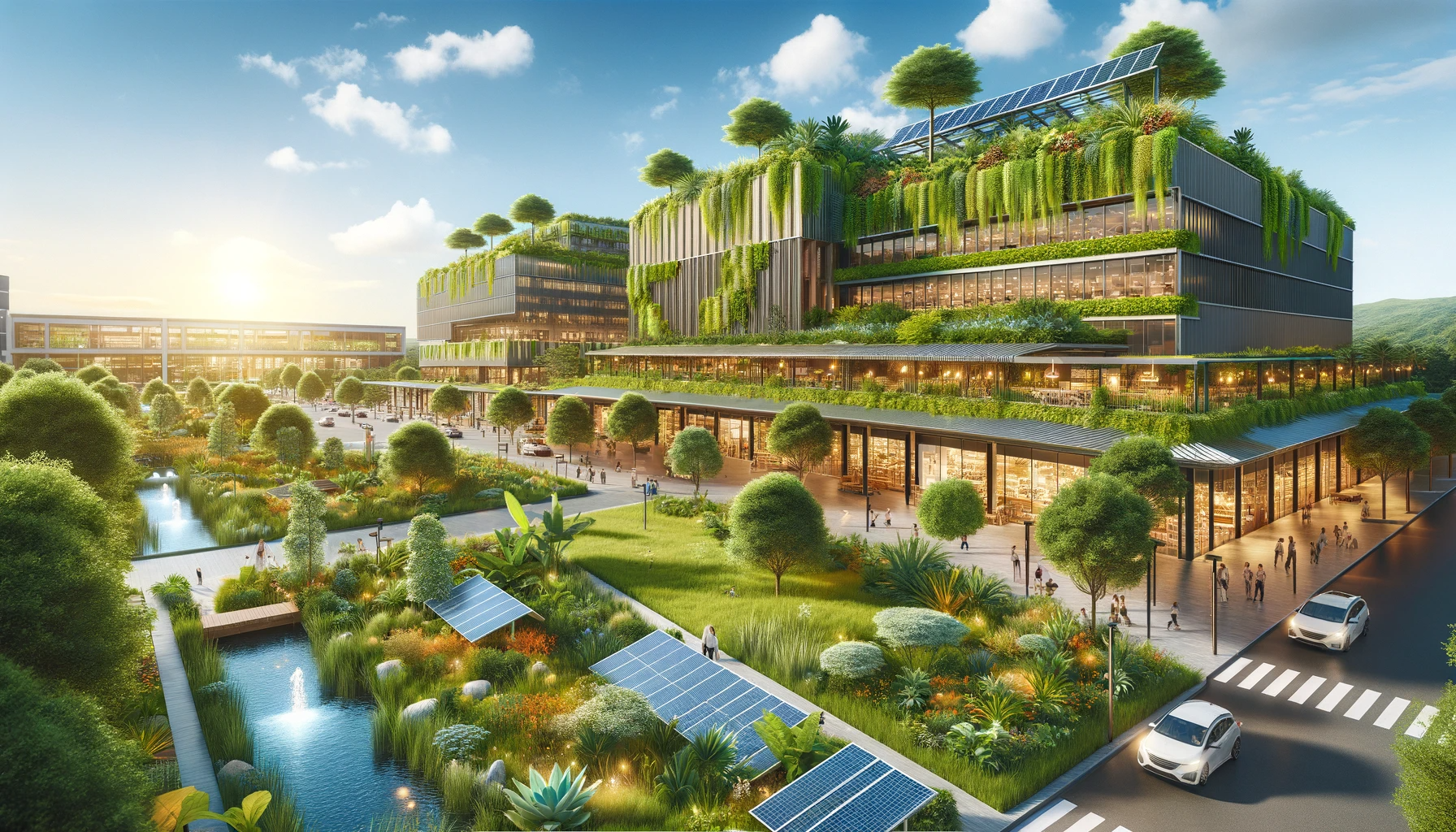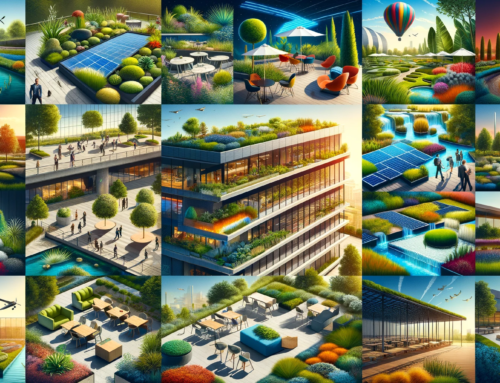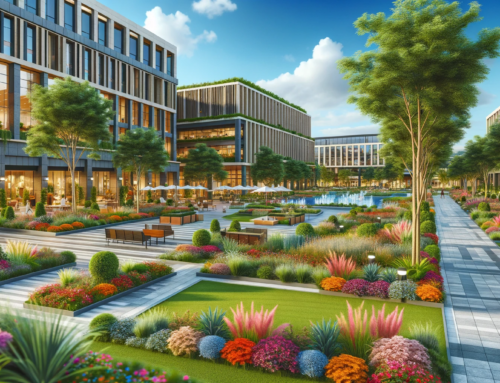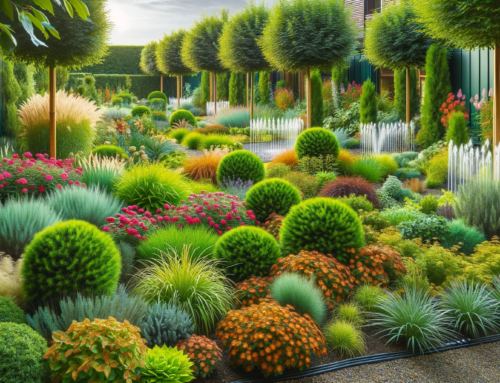Are you ready to transform your commercial landscape into an eco-friendly oasis that will make a positive impact on the environment? Look no further!
In this article, we will explore the essential sustainable practices that modern businesses can adopt to create a greener and more environmentally conscious outdoor space. From choosing native plants to implementing water conservation techniques, you will discover practical tips and tricks to make your commercial landscaping truly eco-friendly.
Get ready to revolutionize your business with these sustainable practices!
Choosing Native Plants
When choosing native plants for your commercial landscaping, it's important to consider their environmental benefits. Native plants are well-adapted to the local climate, soil conditions, and insect population, which means they require less water, fertilizer, and pesticides compared to non-native species.
By using native plants in your landscaping, you can help conserve water resources and reduce the need for chemical inputs, making your commercial space more eco-friendly. Additionally, native plants provide habitat and food for local wildlife, supporting biodiversity in your area. They also help prevent soil erosion and filter pollutants, improving the overall quality of the surrounding environment.
Implementing Water Conservation Techniques
To conserve water in your commercial landscaping, you can implement various techniques that will help reduce water usage and promote sustainability. Here are some effective water conservation techniques you can start implementing today:
-
Install a smart irrigation system: These systems use weather data and soil moisture sensors to adjust watering schedules, ensuring that water is only used when necessary.
-
Utilize drought-tolerant plants: Choose plants that are native to your region and require less water to thrive. These plants are adapted to local conditions and can withstand dry periods without excessive watering.
-
Mulch your landscape: Adding a layer of organic mulch around plants helps retain moisture in the soil, reducing the need for frequent watering.
-
Regularly check for leaks and fix them promptly: Leaky irrigation systems or faucets can waste a significant amount of water. Regular maintenance and prompt repairs can help prevent water loss.
Using Organic Fertilizers and Pesticides
Use organic fertilizers and pesticides to promote a healthier and more sustainable commercial landscaping environment. By opting for organic alternatives, you can reduce the harmful impact of synthetic chemicals on the ecosystem.
Organic fertilizers, such as compost and manure, provide essential nutrients to the soil while improving its structure and water retention capacity. They also promote the growth of beneficial microorganisms, which aid in nutrient cycling and plant health.
Organic pesticides, derived from natural sources like plants and minerals, target specific pests without harming beneficial insects and wildlife. This approach reduces the risk of chemical residues in the soil, water, and plants, ensuring a safer environment for employees and customers.
Embracing organic fertilizers and pesticides is a responsible choice that aligns with your commitment to sustainability.
Incorporating Sustainable Irrigation Systems
Implementing water-efficient irrigation systems is essential for maintaining a sustainable commercial landscape. By incorporating sustainable irrigation practices, you can significantly reduce water waste and promote the long-term health of your landscape. Here are four key considerations to keep in mind:
-
Drip Irrigation: This system delivers water directly to the root zone of plants, minimizing evaporation and runoff.
-
Smart Controllers: These advanced devices use weather data and soil moisture sensors to adjust watering schedules, ensuring that plants receive just the right amount of water.
-
Rainwater Harvesting: Collecting rainwater allows you to utilize a free and abundant water source for irrigation, reducing dependence on potable water.
-
Native Plants: Choosing native plant species that are adapted to the local climate and require less water can help reduce irrigation needs.
Creating Wildlife-Friendly Habitats
By incorporating wildlife-friendly habitats into your sustainable commercial landscape, you can create a thriving ecosystem that supports local biodiversity. Providing food, water, and shelter for wildlife is essential in creating a welcoming environment.
Planting native vegetation not only adds beauty to your landscape but also attracts native birds, butterflies, and other beneficial insects. Including a variety of plant species with different bloom times ensures a continuous food source for pollinators throughout the year.
Installing birdhouses and bat boxes provides nesting opportunities for these creatures, while also controlling pests naturally. Additionally, incorporating water features like ponds or birdbaths attracts a diverse range of species.
Frequently Asked Questions
How Can Commercial Businesses Benefit From Choosing Native Plants for Their Landscaping?
By choosing native plants for your landscaping, commercial businesses can benefit in several ways. Native plants require less water, maintenance, and pesticides, leading to cost savings and a healthier environment for everyone.
What Are Some Effective Water Conservation Techniques That Can Be Implemented in Commercial Landscaping?
To conserve water in commercial landscaping, you can implement effective techniques. These techniques include using drip irrigation, installing rain sensors, and utilizing native plants that require less water.
Are There Any Specific Benefits to Using Organic Fertilizers and Pesticides in Commercial Landscaping?
Using organic fertilizers and pesticides in commercial landscaping offers several benefits. They are safer for the environment, reduce water pollution, promote healthier soil and plants, and protect the health of employees and customers.
What Are Some Examples of Sustainable Irrigation Systems That Businesses Can Incorporate Into Their Landscaping?
You can incorporate sustainable irrigation systems into your landscaping to save water and reduce your environmental impact. Examples include drip irrigation, rainwater harvesting, and using smart controllers to optimize watering schedules.
How Can Creating Wildlife-Friendly Habitats Positively Impact the Environment and the Business Itself?
Creating wildlife-friendly habitats positively impacts the environment and your business. By providing food, shelter, and water sources, you attract beneficial insects, birds, and other wildlife, which can enhance biodiversity and promote a healthier ecosystem.
Conclusion
So there you have it, eco-warrior! By embracing sustainable practices like choosing native plants, conserving water, using organic fertilizers, and creating wildlife-friendly habitats, your business can become a green oasis in the concrete jungle.
Say goodbye to harmful chemicals and wasteful practices, and hello to a thriving, eco-friendly landscape that will make both your conscience and your customers happy.
It's time to revolutionize the way we do business and create a greener future for all.
Let's get planting!




